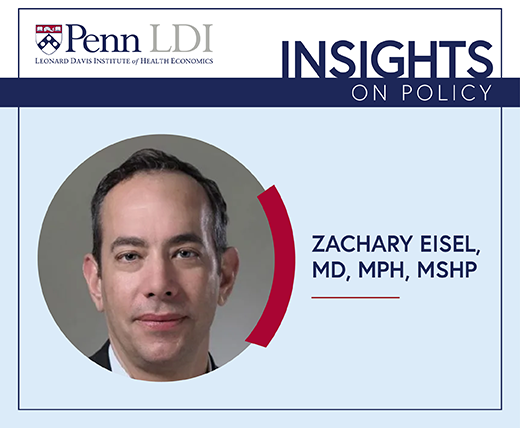
Estimated Overdose Deaths Due to the One Big Beautiful Bill Act
Research Memo: Delivered to House Speaker Mike Johnson and Majority Leader John Thune
Blog Post

Why are large, freestanding psychiatric hospitals receiving more than $2 billion annually from a federal program designed to support safety-net hospitals? The answer lies at the intersection of Medicaid policy, public hospitals, and correctional health care.
Curious? So were we. By statute, Medicaid programs cannot use federal funds to pay for inpatient services in so-called “institutions for mental diseases” (IMDs) with more than 16 beds. The Medicaid and CHIP Payment and Access Commission recently reported that in 2014, IMDs received more than $2.4 billion in Medicaid Disproportionate Share Hospital (DSH) payments, which states distribute to hospitals that serve large numbers of Medicaid and uninsured patients.
In Psychiatric Services, my colleagues and I studied these facilities and characterized those that received DSH payments in 2015 (the most recent data available). In our national sample of 1,112 IMDs, most were for-profit, urban, provided substance use disorder treatment, and participated in Medicaid. Just 13% of these IMDs received DSH payments. Government-owned IMDs were the most likely to receive DSH payments compared to for-profits and nonprofits. And the biggest predictor of a facility receiving DSH payments was if it provided mental health care to “forensic” patients—those in the custody of the criminal justice system or whose hospitalization is related to a criminal offense.
This could be a problem. Individuals in the custody of the criminal justice system are often ineligible for federal insurance programs and, when receiving inpatient psychiatric care, have much longer lengths of stay compared to typical inpatients. These patients are expensive. Are states using Medicaid DSH payments to subsidize costs incurred by the criminal justice system? The use of DSH dollars to offset these costs leaves fewer DSH dollars available for other types of hospitals, such as general, acute care, and safety-net hospitals.
Since 1965, Medicaid has prohibited the use of federal Medicaid matching funds for payment of care provided in IMDs (absent a waiver, use of a managed care organization, or other exceptions). This prohibition exists as a result of both fiscal considerations and longstanding concerns from advocates about the unjust and inhumane conditions in these psychiatric hospitals. Policymakers did not want states to shift the costs of institutionalization to the federal government through the new Medicaid program, and they also wanted to support efforts towards deinstitutionalization. The Medicaid IMD exclusion itself is the subject of ongoing controversy, but it does reflect the original intent of Medicaid. It is fair to question whether the use of Medicaid DSH payments to subsidize care in IMDs is consistent with this intent.
Our study raises important questions about the flow of federal Medicaid dollars to state-owned IMDs, and about using DSH payments to subsidize state budgets for correctional health care.
The study, Characteristics and Financing of Institutions for Mental Diseases was published on November 4, 2021, in Psychiatric Services. The authors include Morgan C. Shields, A. G. Hollander, Steven C. Marcus, and Paula Chatterjee.

Research Memo: Delivered to House Speaker Mike Johnson and Majority Leader John Thune

Research Memo: Delivered to House Speaker Mike Johnson and Majority Leader John Thune

Historic Coverage Loss Could Cause Over 51,000 People to Lose Their Lives Each Year, New Analysis Finds
Research Brief: New Incentive Structures and Metrics May Improve Program Performance

Research Memo: Response to Request for Technical Assistance

Immigration Crackdown and Medicaid Cuts Put Millions at Risk